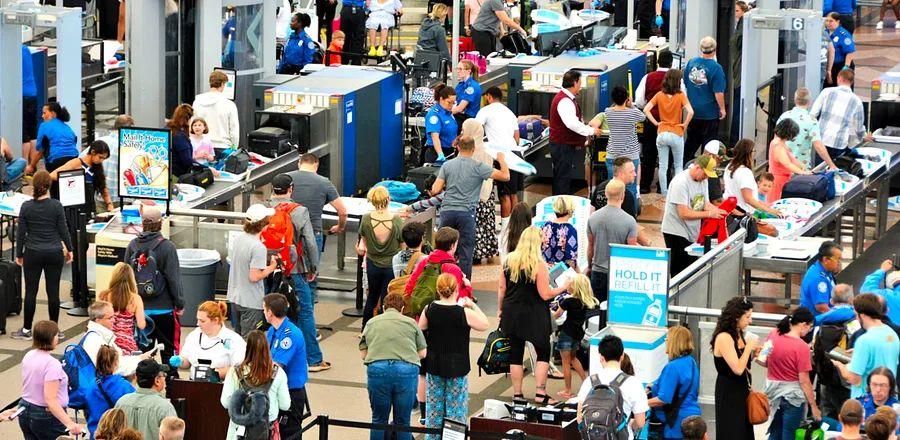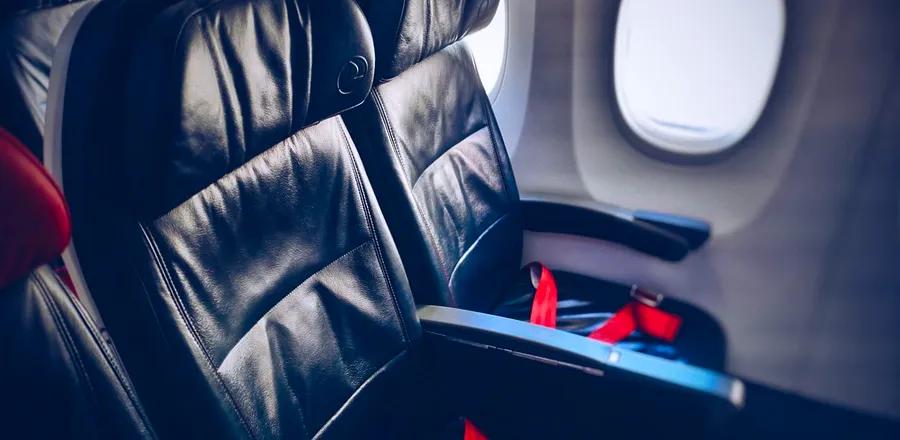The Busiest Travel Days of the Year, According to TSA

Each day, millions board planes for business or leisure travel, but some days see significantly more traffic. Earlier this year, the Transportation Security Administration (TSA) announced its record for the busiest travel day ever: on July 7, 3,013,622 travelers passed through TSA checkpoints, the first instance of exceeding 3 million.
This record could be broken this year. The peak travel days often fall just before or after major holidays. According to the TSA, the busiest days typically occur on the Tuesday and Wednesday before Thanksgiving, along with the Sunday that follows. However, busy airports aren't limited to holiday periods.
Here’s a list of the busiest travel days of the year.
Peak travel days throughout the year
Thanksgiving and Christmas are typically some of the busiest travel days of the year, but other holidays such as Memorial Day, Independence Day, and Labor Day also experience heavy air travel.
So far this year, the number of daily passengers has steadily increased each month. In all of 2023, there were only three days with more than 2.8 million travelers. However, between January 1 and October 15, 2024, there have been 38 days surpassing that figure.
Here are the 15 busiest travel days over the past year:
- July 7, 2024: 3,301,622 travelers
- June 23, 2024: 2,996,495 travelers
- July 18, 2024: 2,957,170 travelers
- May 24, 2024: 2,951,859 travelers
- June 24, 2024: 2,944,001 travelers
- June 28, 2024: 2,938,292 travelers
- July 14, 2024: 2,937,845 travelers
- June 14, 2024: 2,929,467 travelers
- July 25, 2024: 2,924,478 travelers
- July 28, 2024: 2,922,306 travelers
- July 27, 2024: 2,921,490 travelers
- June 9, 2024: 2,914,565 travelers
- August 30, 2024: 2,909,901 travelers
- November 26, 2023: 2,908,785 travelers
- July 21, 2024: 2,908,201 travelers
Advice for flying during peak travel seasons
Here are some tips to make your travel smoother and to navigate busy TSA checkpoints more efficiently this holiday season, as passenger volumes begin to increase.
Consider enrolling in TSA PreCheck, Clear, and/or Global Entry
These security fast-track services have never been more beneficial given the current surge at U.S. airports. TSA PreCheck has recently lowered its fee from $85 to $78 for a five-year membership, with renewals at just $70. Clear is available for $199 annually. For international travelers, the $120 Global Entry program, which includes TSA PreCheck, offers quicker customs processing upon entry into the U.S. Certain credit cards, like the Capital One Venture X and the Delta SkyMiles Reserve American Express Card, cover the costs of TSA PreCheck or Global Entry.
Check if your airport offers a fast-pass security lane that you can reserve in advance—at no cost
No TSA PreCheck or Clear? Some U.S. airports allow travelers to make an advance “fast pass” reservation to skip to the front of the security line—completely free. We’ve compiled a complete list of airports providing this service.
Think about traveling with just a carry-on
If you want to avoid the hassle of lost luggage during busy travel periods—especially when airports are short-staffed—or if you’d prefer not to spend ages waiting at the baggage claim, using a carry-on is likely your best option. Another solution? Consider luggage-shipping services.
Understand what you can take through security
When packing a carry-on, it’s important to refresh your memory on the rules regarding what’s allowed. Remember that you can only bring liquids in containers of 3.4 ounces or less. Holiday staples like gravy, cranberry sauce, or wine should either be left at home or placed in checked baggage, as they will be confiscated if carried on (leading to delays). Consult Dinogo’s comprehensive guide to foods allowed through TSA to ensure your carry-on contents are compliant with security regulations.
Double-check your bags before heading out
TSA advises travelers to thoroughly check their bags before packing to avoid accidentally bringing items that could cause delays at the airport. During the 2022 holiday season, TSA discovered a cat that had hidden in a traveler's bag—and there are also other unexpected items that TSA prohibits from being carried on.
Keep an eye on the weather
Stay updated on weather conditions using resources like the National Weather Service, the Weather Channel, and AccuWeather so you can prepare for potential disruptions and create alternative plans in case of travel delays. Here’s how airlines decide whether to operate flights in adverse weather.
Arrive at the airport earlier than expected
Wait times and lines at airports across the country (and internationally) are longer than they have been in years. It’s wise to arrive early, giving yourself ample time after passing through security, rather than risking a missed flight due to lengthy check-in or security lines. Aim for at least two hours before domestic flights and three hours for international flights.
Be aware of your refund rights for delayed or canceled flights
This year, the U.S. Department of Transportation (DOT) established new regulations requiring all airlines that operate flights to, from, or within the United States to offer immediate cash refunds to travelers in case of cancellations or significant delays.
Starting in October 2024, airline passengers will be eligible for a quick refund for:
- Any canceled or substantially changed flight. You are entitled to a refund if your flight is canceled or significantly delayed, provided you decline any travel vouchers or alternative transport offered by the airline. The new regulations define a significant delay or change as a departure or arrival that occurs more than three hours late for domestic flights and six hours late for international flights; changes in the arrival or departure airport; an increase in the number of connections (such as adding a layover to a flight that was supposed to be nonstop); downgrading of service class; connections through different airports; or switching to an aircraft that is less accessible for passengers with disabilities.
- Delayed baggage. If your checked bag is not delivered within 12 hours of a domestic flight's arrival or within 15 to 30 hours of an international flight's arrival (depending on the flight length), you are entitled to a refund for your baggage fee.
- Services not rendered. You are entitled to a refund for any service that you paid for but did not receive, including Wi-Fi, specific seat selections, and in-flight entertainment.
Prior to the implementation of this new rule by the DOT, airlines had the freedom to establish their own criteria regarding which flight schedule changes would qualify for a refund. This led to varied refund policies among different airlines, making it hard for passengers to understand or enforce their refund rights. The DOT received complaints about some airlines modifying their refund policies to be less favorable during periods of increased flight cancellations and changes, as noted by the DOT.
Under the new regulations, airlines are required to provide refunds that are:
- Automatic: Airlines must issue refunds automatically, without requiring passengers to make explicit requests or go through unnecessary processes, as stated by the DOT.
- Prompt: Refunds should be processed within seven business days for credit card transactions and within 20 calendar days for other payment methods.
- In cash or original payment form: Airlines cannot offer travel vouchers or future flight credits unless the passenger agrees to that alternative payment method.
- For the full amount: Refunds must cover the entire cost, including taxes and fees, minus any portion of the service already used.
Additionally, airlines are obligated to promptly inform travelers who experience cancellations or significant delays about their entitlement to a refund.
This article was first published online in 2018 and was last updated on October 17, 2024, to reflect the latest information.

1

2

3

4

5
Evaluation :
5/5